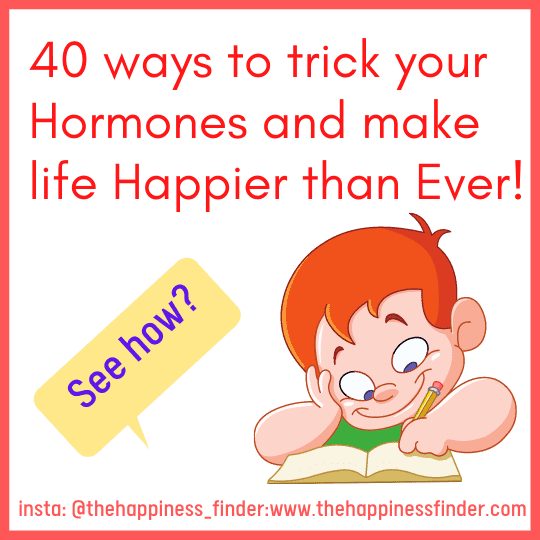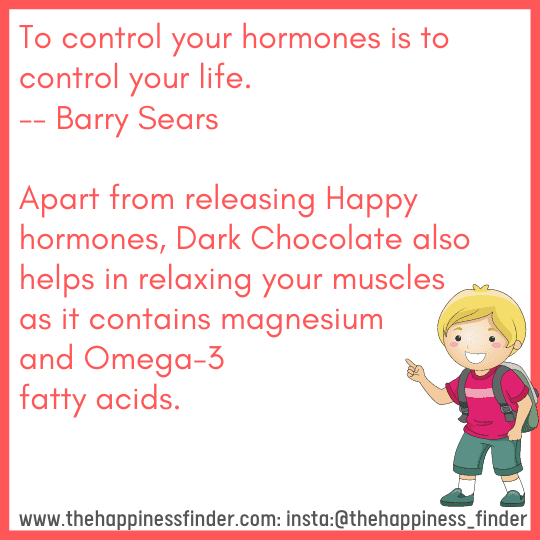Hormones are chemicals produced by various glands in our bodies. They travel through the bloodstream, act as messengers to reach different organs, and play an important role in different bodily processes. Once released by the glands into your bloodstream, they target organs and tissues to control everything from the way your body will function to how you will feel all day. You should learn ways to trick your happy hormones and stay happy forever.
Happy Hormones induce positive feelings of happiness and pleasure whenever active.
To control your hormones is to control your life.
— Barry Sears
Hormones are the messengers that regulate :
# The Energy in our body,
# Our mood throughout the day,
# Overall weight of our body,
# External appearance,
# The anxiety levels and
# Even our fertility.
Technically the hormones communicate between the two glands in our body or between a gland and an organ.
It is very important to keep the hormonal balance in your body.
Even a small imbalance can harm your health.
In your everyday busy life, some days you could forget to eat your breakfast or may not be able to sleep properly, due to heavy workload in the office. Or totally feel depressed after a breakdown in a relationship.
So, accordingly, different hormones will be released in your body and will induce a good or a bad effect on your mind and body and then it becomes very common to suffer with hormonal imbalance.
Every problem has a remedy, hormone imbalance also does have a cure. We have mentioned below a few ways that help you balance your hormones, naturally!
Hormones are very powerful things. We are helpless in their wake.
— Meg Cabot
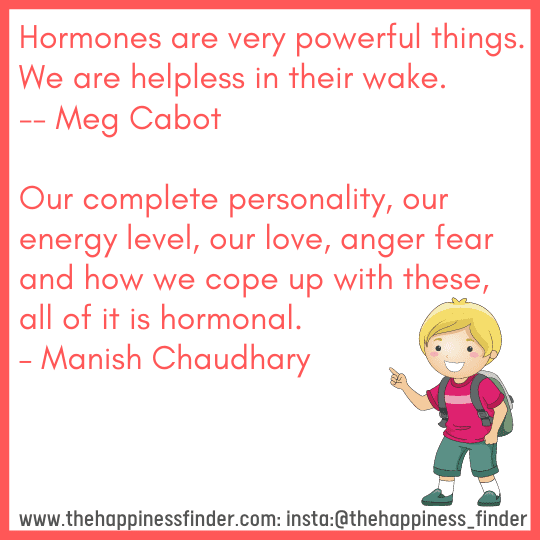
What are Happy hormones (and neurotransmitters)?
Some hormones are responsible for the regulation of mood, the experience of pleasure, bonding, and even relief during pain.
But that’s not the only function of hormones. These chemicals are critical in maintaining your health, like growth and development, regulating metabolism, and reproduction too.
Sometimes, these hormones are called neurotransmitters.
The only difference between hormones and neurotransmitters is in the place where they act.
Happy hormones travel via the bloodstream to different organs and tissues of the body, while happy neurotransmitters occupy the brain and central nervous system where they communicate directly via neurons.
Endorphins, dopamine, oxytocin and serotonin are the famously known “Happy Hormones”. These promote the positive feelings of pleasure, happiness, and love.
Happy hormone 1. Endorphin chemical
Happy hormone 2. Dopamine chemical
Happy hormone 3. Serotonin chemical
Happy hormone 4. Oxytocin chemical
Hormones, as well as the neurotransmitters are involved in vital and essential processes, such as:
# Heart rate regulation,
# Digestion and absorption of food, and
# Also controls mood and feelings.
Hormones are also called the chemical messengers inside the body that controls the ability to help people to:
> bond with each other,
>> feel the joy, and
>> Experience pleasure in life.
Our complete personality, our energy level, our love, anger, fear and how we cope up with these, all of it is hormonal. – Manish Chaudhary
also, the hormones in your body increase and decrease throughout the day. For example,
An increase of a hormone called cortisol wakes you up in the morning,
While another hormone, called melatonin, it makes you fall asleep at night.
There are different hormones to tell you that you are hungry, our tummy is full, and make you are happy or sad.
Technically what happens is – the endocrine system present in our body is responsible for controlling the production and release of hormones into the bloodstream.
It is a network of glands running throughout the body. Each gland makes at least one hormone, and which is further controlled by the pituitary gland, present in the brain.
What hormones make you happy?
The body has many feel-good, happiness hormones in your body, are described as below.
Hormone Feel good function
Endorphins Pain relief, relaxation
Dopamine pleasure, motivational role in brain’s reward system
Oxytocin Bonding, love, trust
Serotonin mood stabilizer, wellbeing, happiness
It is a less known fact that the happiness hormones directly depend on:
>> Your environment,
>> Relationships you keep,
>> The people you hang out with,
>> Your Hygiene,
>> Daily diet,
>> The exercise routine, you follow,
>> The bacteria present inside your intestines and,
>> Your mental state, your overall health etc.
The key to being happy is knowing that you have the power to choose what to accept and what to let go. – Dodinsky
Now you know, that you have the power to change your mood by the choices you make every day.
Today, we are going to find out, what are the right choices we have to make and what are the tricks to hack our happy hormones and live a happy life forever.
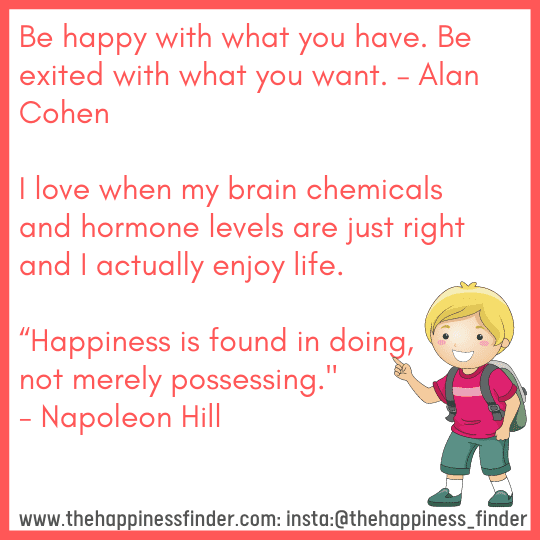
How does the hormonal system work?
When a hormone is released from a gland, it travels via the bloodstream throughout the body and finally reaches its target location. At the target location, the hormone gets attached to the receptor cell, to perform the desired action.
Hormones can:
> Control heart rate and sleep cycles.
> Regulate sexual functions and reproduction.
> Make other cells in the body, grow faster,
> Result in the release of another hormone,
> Absorbs sugar from the blood, and many others.
Here we will focus more on the Happy Hormones and how they will make our life more happy.
What are the happy hormones and how do they work inside the human body?
Happy Hormone 1. Endorphin chemical
Happy Hormone 2. Dopamine chemical
Happy Hormone 3. Serotonin chemical
Happy Hormone 4. Oxytocin chemical
These are also called “feel good hormones” because they sometimes produce feelings of happiness and euphoria.
1. What are Endorphins?
These chemicals are produced naturally by the nervous system and they manage pain and stress. They are called “feel-good” chemicals because they act as a happiness booster and pain reliever.
These chemicals are produced naturally in the body during pleasure activities such as exercise, having sex, eating a chocolate and laughing.
They are also produced during painful experiences such as twisting your ankle, in order to temporarily relieve pain and discomfort.
Endorphins are also called “the runner hormone” because their effect can be felt after lengthy, vigorous exercises.
Endorphins make you happy but not in the way you might think.
They are body’s natural pain relievers and they can boost mood too.
Endorphins are primarily made in the hypothalamus and pituitary glands.
The level of production of endorphins in the human body is an individual trait.
Disadvantages of Low Endorphin levels in the body, as it can cause:
> Depression, unless treated.
> Long term pain all over the body.
> Muscle stiffness.
> Soft spots that pains when touched.
> Early fatigue.
>Lower levels of energy.
> Sleeping problems.
What are the benefits of endorphins?
Endorphins help:
> Decrease pain and discomfort.
> Boost pleasure.
> Reduce stress, depression, and anxiety.
> Fight inflammation.
> Elevate mood.
> A boost in self esteem etc.
Down below are the 40 ways to trick your all four Happy Hormones and stay happy forever!
Apart from releasing Happy hormones, Dark Chocolate also helps in relaxing your muscles as it contains magnesium and Omega-3 fatty acids.
2. What is dopamine?
Dopamine is a neurotransmitter produced in the brain. i.e. It acts as a chemical messenger between neurons in the brain.
Dopamine is released when your brain is expecting a reward. This neurotransmitter is used for communication by the regions of the brain comprising the “reward system”.
It could be anything that you enjoy or appreciate such as:
> Certain foods,
> Sex, shopping, or just about anything else that gives you a boost.
Along with its “feel good” function, dopamine is also involved in many body functions, such as:
>> Regulating Blood flow.
>> Proper digestion of food.
>> Keeping up with healthy heart and kidney function.
>> Good memory and focus.
>> Controlling mood and emotions.
>> Managing motor control functions of the body.
>> Processing the feeling of pain.
>> Regulating Pancreatic function.
>> Insulin regulation.
>> Pleasure and reward seeking behavior.
>> Maintaining deep sleep and stress response.
What are the disadvantages of low dopamine levels in the body?
Low dopamine levels is linked with numerous mental health disorders.
Common conditions linked with dopamine deficiency include:
# depression.
# schizophrenia.
# Parkinson’s disease.
# Hallucinations or delusions
What are the signs of dopamine deficiency?
Ans: Common symptoms include:-
>> Muscle cramps,
>> Stiffness in the muscles
>> Unable to balance the body
>> Indigestion and constipation
>> Difficulty in eating and swallowing
>> Not able to sleep
>> Lower levels of energy, easily fatigued
>> Not able to focus
>> Low sex drive
Down below are the 40 ways to trick your all four Happy hormones and stay happy forever!
I love when my brain chemicals and hormone levels are just right and I actually enjoy life.
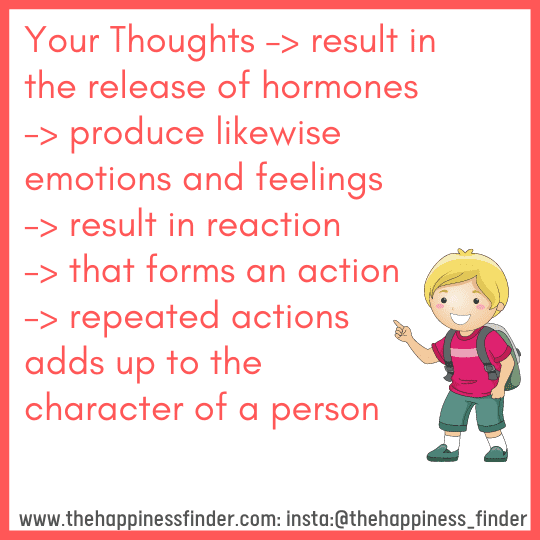
3. What is Serotonin?
Serotonin is a naturally occurring chemical that functions as a neurotransmitter to carry signals the all over the body.
It is a chemical produced by nerve cells. Serotonin is found mostly in the digestive system. It is also present in the central nervous system.
Along with functioning as a transmitter of signals, serotonin also regulates signal intensity.
Serotonin may have an impact on:
>> The cardiovascular health.
>> Metabolism in the bones.
>> Clotting of blood.
>> Disorders in the nerve cells.
>> Eye health.
What does serotonin do? And how does it work?
Serotonin affects almost every part of your body, from impacting your motor functions to influencing your emotions.
Serotonin also helps:
Serotonin is considered a natural mood stabilizer.
It’s the chemical that helps with sleeping, eating, and digesting.
How does serotonin help us?
> it minifies depression,
> Reduce anxiety,
> Clotting of the blood/ heal wounds,
> Sleeping, eating and digestion.
> Helps in regulating bone health.
> Strengthening of bones
> Enhanced sexual function.
What are the Harmful effects of serotonin deficiency?
Serotonin deficiency results in:-
# Mild to severe depression.
# Disturbed sleep.
# Weak memory, difficult to remember.
# Schizophrenia
# Anxiety issues
# Loss of appetite
# Digestion issues.
# Disturbed, internal body clock.
Be happy with what you have. Be exited with what you want. – Alan Cohen
4. What is Oxytocin?
Oxytocin is a hormone that is produced in the hypothalamus and is secreted into the bloodstream by the pituitary gland (present at the backside of the brain).
It is a chemical messenger in the brain and acts on organs in the body (including the breast and uterus).
It controls the key aspects of the reproductive system, including childbirth and lactation.
The two main actions of oxytocin in the body are:
>> Contraction of the womb (uterus) during childbirth and
>> Lactation (Production of milk in the mammary glands of humans)
# Oxytocin is also called the cuddle hormone
# Oxytocin promotes bonding and trust,
# Helps regulate stress responses and
# Calms down the nervous system.
What are the Disadvantages of Low Oxytocin levels in the body?
Low oxytocin levels in a nursing mother can cause problems in:
> Lactation,
> Milk ejection and
> Breast feeding.
Overall, low oxytocin levels can cause problems in childbirth and breastfeeding.
# It can also cause sleep sickness and result in low Empathy.
Lack of oxytocin is also linked with:
> Autism and
> Autistic spectrum disorders.
40 ways to trick your all four Happy hormones and stay happy forever!
Happy Hormone 1. Endorphin chemical
Endorphins relieve pain, reduce stress and boost feelings of pleasure and physical well-being. To easily boost this hormone:
- Do Exercise.
- Have Sex.
- Burn essential oils.
- Laugh.
- Dance.
- Be creative/ Art drawing.
- Eat spicy food.
- Eating dark chocolate
- Drink red wine
- Do positive affirmations
Happy Hormone 2. Dopamine chemical
- Eat a protein rich diet.
- Exercise.
- Listen to upbeat music.
- Get a deep, restful sleep.
- Meditate.
- Eat chocolate.
- Spend time in the sun.
- Accomplish a small task and treat yourself.
- Spend time in the sun –Take Sunbath.
- Consume Omega-3 chemical once a day.
Happy Hormone 3. Serotonin chemical
- Spend time in Nature.
- Meditate/ do Breathing exercises.
- Do yoga.
- Take vitamin D supplements.
- Infrared sauna.
- Listen to white-noise/nature sounds.
- Spend time in the sun.
- Get a massage.
- Go for a hike.
- Listen to soft instrumental music.
Happy Hormone 4. Oxytocin chemical
- Help someone/do charity.
- Hug someone close.
- Spend time with friends.
- Play with a dog.
- Talk to a loved one on the phone.
- Consume caffeine.
- Sing with a mood.
- Get a massage.
- Vitamin C & D supplements.
- Do yoga.
“Mood Swings can occur due to Hormonal conditions. Teens, pregnant women or women experiencing menopause may feel change in moods. Even medical conditions that affect your lungs, thyroid and cardiovascular, or central nervous system can also cause Mood Swings’
Frequently asked questions
What is the importance of balanced hormones?
Hormones are tiny microparticles in our body, but they are powerful enough to control the vitals of your body and imbalanced hormones can be a disaster for the body. Therefore, it is important to know the root cause of hormonal imbalance and treat it significantly.
What are the causes of hormonal imbalance?
Causes of hormonal imbalance are:
# Lack of good nutrition
# Adrenal exhaustion, stress and anxiety
# Hormone replacement therapy (HRT) and birth control pills
# Insulin or glandular imbalance
# Drugs, stimulants and chemicals
# Pregnancy and Post-partum
# Foods that help in balancing your hormones
# Essential nutrients from plant sources
And many others. Know all
What are the Symptoms of hormonal imbalance?
The most common symptoms of hormonal imbalance occur during:
>> The period of puberty.
>> Menstruation in women.
>> Pregnancy and post-partum, and during.
>> Premenopausal and menopause.
The other symptoms include:
>> Very frequent migraine.
>> Acne problem.
>> Sweet Cravings.
>> Allergy to certain things.
>> Sleep problems.
>> Oily or dry skin.
>> Mood swings.
>> Weight gain.
>> Depression.
>> Excess hair growth.
>> Urinary tract infections.
>> Unwanted changes in the body temperature.
>> Water retention.
>> Unexpected obesity.
>> Urinary tract infections.
>> Urinary tract infections.
>> Feeling anxious and irritated.
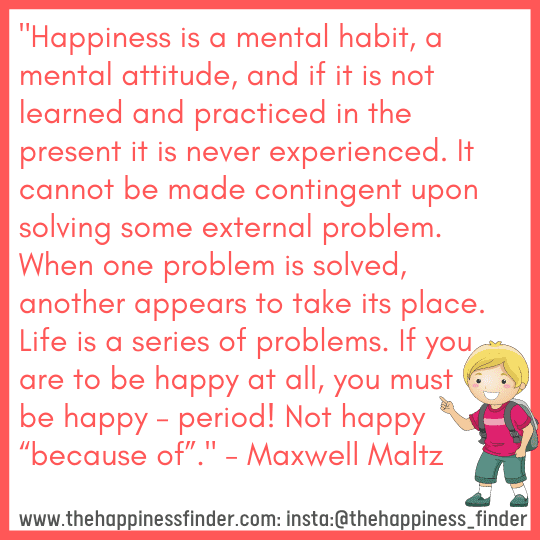
“Happiness is a mental habit, a mental attitude, and if it is not learned and practiced in the present it is never experienced. It cannot be made contingent upon solving some external problem. When one problem is solved, another appears to take its place. Life is a series of problems. If you are to be happy at all, you must be happy – period! Not happy “because of”.”
– Maxwell Maltz

